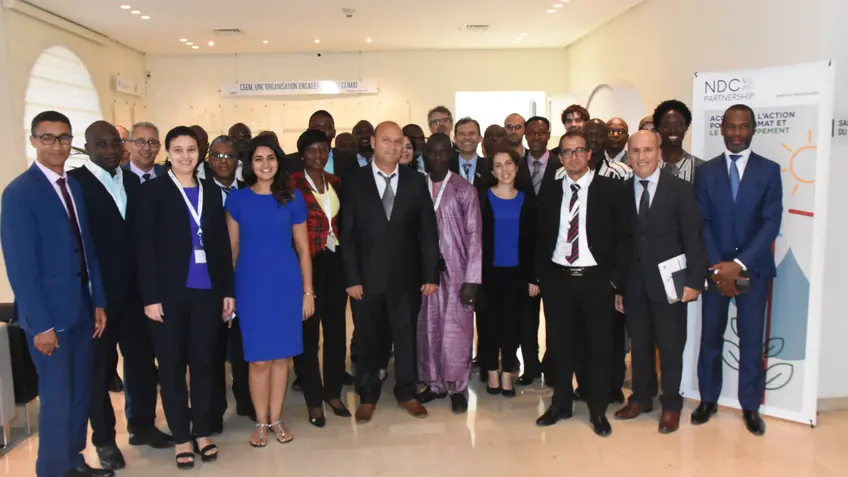Engaging The Private Sector In A Low Carbon Transition: Lessons from Morocco
As African countries transition to low-carbon development, the engagement of the private sector as a critical partner in the process becomes ever more important. Using Morocco as an inspirational example, the NDC Partnership and the NDC Support Programme of UNDP organized a two-day meeting in Casablanca with participants from Burkina Faso, Côte d'Ivoire, Mali, Togo and Tunisia to discuss options for engaging the private sector. The meeting was hosted by the Confédération Générale des Entreprises du Maroc (CGEM), the largest private sector association in Morocco.
Morocco has demonstrated strong leadership on the fight against climate change under the Paris Agreement, - and it has done so with a remarkable involvement of its private sector. A number of factors have been driving this success:
- Starting with a clear vision of the government's low-carbon strategy. Morocco decided to launch its energy transition as early as 2009. The energy sector accounts for two thirds of the country's CO2 emissions and fossil fuels are almost entirely imported. Today, more than 3,500 MW of renewable energies are installed, reducing the country's dependence on fossil fuels by 90%. After the Paris Agreement, Morocco immediately integrated the targets of its national climate plan into a comprehensive low-carbon strategy that included the private sector as a key player in its implementation.
- Conducting legislative and regulatory reforms that increased transparency in investments and accelerated energy efficiency measures in the public building sector. For example, Law 13.09 on the development of renewable energy allows companies to self-produce their energy up to 50 MW and gives them the possibility to sell the surplus to the National Office for Electricity and Water (ONEE). In addition, private renewable energy plants are now free to sell their electricity directly to consumers.
- Creating low-carbon business and income generation opportunities. Morocco’s climate plan, or nationally determined contribution (NDC), calls for the development of new low-carbon solutions. It thus presents an opportunity for companies to diversify their products and services, while also creating local value and jobs for the community. Engaging in the implementation of NDCs can be a business opportunity for the companies involved.
- Effective mobilization of private sector actors. Morocco’s work on increasing companies’ awareness and capacity on climate issues started more than 20 years ago through the General Confederation of Moroccan Enterprises (CGEM), which has a dedicated commission for environmental and climate issues. The goal is to obtain buy-in and secure business actions that contribute to the achievement of the Kingdom’s low-carbon objective. This engagement was further boosted by Morocco’s organization of the Conference of the Parties (COP 22) in 2016, which facilitated strong mobilization of the private sector around the Paris Agreement.
While Morocco’s private sector strategy provides inspiration, the meeting showcased other options for integrating the African private sector more closely in the energy transition:
- Access To Finance For Small and Medium Enterprises. One of the biggest contraints to private sector engagement in low-carbon projects is a lack of access to finance. When financing exists, it is often conditioned by large guarantees against which enterprises, especially small and medium enterprises (SME), feel powerless. The African Guarantee Fund (AFG) can help access financing by granting partial loan guarantees to banks and financial institutions on behalf of these SMEs. A bank intending to lend to SMEs can call directly on AGF to obtain a guarantee of up to 50% for traditional loans and 75% for climate-friendly loans, or a maximum of USD 5 million. AGF currently has 140 banking partners across Africa.
- Capacity Building For Small and Medium Enterprises. The West African Development Bank (BOAD) provides support through its Regional Collaboration Centre, which is the result of a partnership between the BOAD and the United Nations Framework Convention on Climate Change (UNFCCC). Talks are underway with the Green Climate Fund to see how public resources can be used to put in place the necessary guarantees to attract the private sector. The bank also has a tool that helps companies identify financial resources. The Bank works with chambers of commerce and business associations to popularize the tool, and offers financing for companies of all sizes. Finally, it assists countries in the revision of their NDCs, the improvement of their institutional and regulatory frameworks, carbon pricing, and the structuring of Green Bonds and transparency frameworks.
- Co-production Of Low-Carbon Solutions. Morocco’s success with the energy transition is due to upstream decisions taken in consultation with the private sector. Other countries, such as Côte d'Ivoire, are following the same trajectory as Morocco. According to the Confédération Générale des Entreprises de Côte d'Ivoire (CGECI), the Ivorian government involves the private sector in all renewable energy initiatives and shares its short-term and long-term development strategies. For example, in response to government’s energy efficiency goals, CGECI organized the Energy Efficiency Forum to share information and potential business opportunities with the companies.
The Moroccan experience and the support options offered by financial institutions show that there is ample room for the strategic engagement of the African private sector as a partner in transitioning to low-carbon development. This two-day exchange provided a source of inspiration for Burkina Faso, Côte d'Ivoire, Mali, Togo and Tunisia to advance public-private collaboration on the Paris Agreement.
This blog was written by Brice Delagneau of Afrique Green Side and Catherine Diam-Valla of UNDP as contribution to the NDC Partnership Blog.
